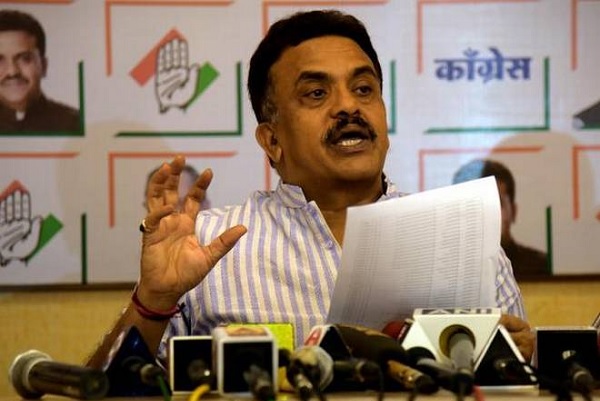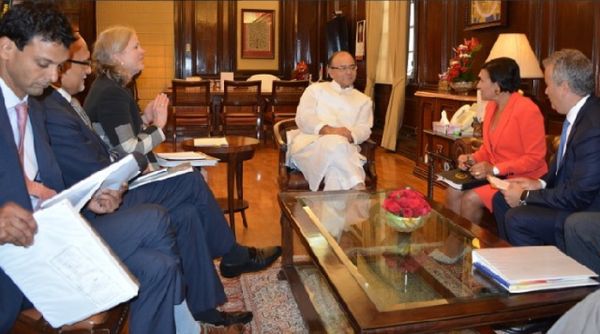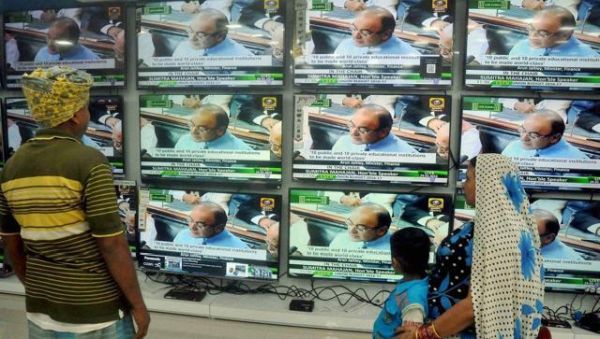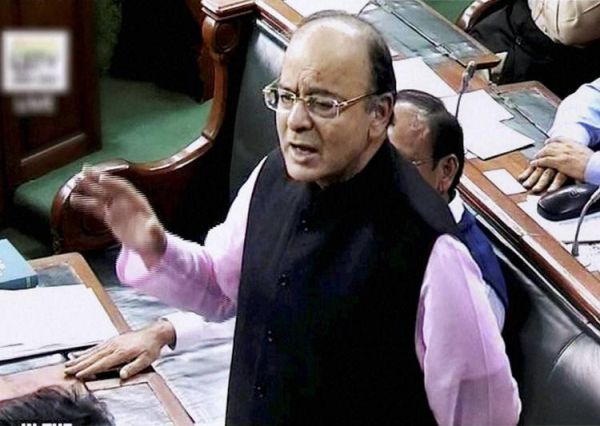
by admin | May 25, 2021 | Corporate, Corporate finance, Corporate Governance
 The bankruptcy of the infrastructure lending giant IL&FS is a result of poor corporate governance by the BJP Govt: Sanjay Nirupam
The bankruptcy of the infrastructure lending giant IL&FS is a result of poor corporate governance by the BJP Govt: Sanjay Nirupam
By Asmita Jadhav,
Mumbai: Mumbai Congress President Sanjay Nirupam today claimed that PM Modi and Finance Minister Arun Jaitley have been pressurizing the state-owned LIC and SBI to bail out the debt ridden Infrastructure Leasing & Financial Services (IL&FS) with the money which belongs to the common people of the country. He has also demanded a high level probe into this matter in order to investigate the role of multiple BJP Ministers who have been taking advantage of their positions and exploiting IL&FS for their vested interests.
Sanjay Nirupam said, “Being a 30-year old infrastructure lending giant, IL&FS has gone completely bankrupt today. How did the debt of this company jump by 44% and its profitability decline by 900% only in the past 3 years? The entire stock market has shaken in the past 2 weeks over this issue. Despite all, PM Modi and Finance Minister Arun Jaitley have been pressurizing LIC & SBI to pay more money and bail out IL&FS. Largest Public sector financial institution LIC owns maximum stakes i.e. 26.34% stakes in IL&FC. It also has almost 29 Crore policy holders and majority of them are common people. The Govt wants the LIC, along with the largest public sector bank SBI, to spend this money which belongs to the common people only to protect the foreign investors. If the Modi Govt doesn’t stop its trend of using the money belonging to the people only to protect its favourites, we will soon witness a situation like that of the Lehman Brother’s Collapse in the year 2008”.
Mr. Nirupam also raised questions as to why no one is questioning the fact that many board members of IL&FS have resigned from their posts. “The RBI had raised a red flag and pre-emoted this crisis a few years ago. Why did the Financial Ministry refrain from taking any precautionary measures? What is the Govt doing to ensure that none of the members who have resigned become another Nirav Modi or Mehul Choksi”, asked Nirupam.
The Mumbai Congress President demanded a high-level probe in this entire issue requesting an investigation to be conducted on the role played by multiple ministers of the BJP Govt in exploiting IL&FS before it went completely bankrupt.
Infrastructure Leasing & Financial Services (IL&FS) has about $500 Million in repayment. However, the firm has only $27 Million available. It has put its corporate headquarters worth Rs. 1300 Crore on sale, it has also identified almost 25 projects for sale. The firm also plans to sell their assets and bring down the debt by almost 30,000 Crore which comprises of only one-third of the total amount. However, this process will take almost a year while the firm has $500 Million in repayment which are due in the second half of this financial year. As of March 2018, LIC owns 25.34% stakes in IL&FS making them the company’s largest stakeholders. It is followed by Japan’s Orix Corporation which has 23.54% stakes in the company. Abu Dhabi Investment Authority, HDFC, Central Bank Of India & SBI hold 12.56% , 9.02%, 7.67% and 6.42% respectively.

by admin | May 25, 2021 | Corporate, Corporate Governance, News, Politics
 New Delhi : The slugfest over the Rafale deal continued on Sunday with Union Finance Minister Arun Jaitley citing conflicting media reports on Francois Hollande’s claims regarding a private firm becoming an as offset partner in the jet deal at the instance of Modi government and asserting that there was “no partnership as suggested by the former French President”.
New Delhi : The slugfest over the Rafale deal continued on Sunday with Union Finance Minister Arun Jaitley citing conflicting media reports on Francois Hollande’s claims regarding a private firm becoming an as offset partner in the jet deal at the instance of Modi government and asserting that there was “no partnership as suggested by the former French President”.
Riding on Hollande’s remark to French website Mediapart that that the Indian government had proposed choosing a private firm as an offset partner, the opposition has been gunning for the Bharatiya Janata Party (BJP) regime with Congress president Rahul Gandhi even claiming that the former French President had called Prime Minister Narendra Modi a “thief”.
While both the Defence Ministry and Law Minister Ravi Shankar Prasad have maintained that the Indian government had no role in the choice of the offset partner, Jaitley took to social media to reiterate the assertions and pointed to Hollande’s “contrasting remarks”.
“A controversy is sought to be created on the basis of a statement made by Hollande, that the Reliance Defence ‘partnership’ with Dassault Aviation was entered at the suggestion of the Indian GOvernment.
“In a subsequent statement the former President has sought to suggest that Reliance Defence emerged on the scene after the agreement with the Indian Government was entered into. He has, in a subsequent statement, said that he is ‘not aware’ if government ever lobbied for Reliance Defence and that athe partners chose themselves’. Truth cannot have two versions,” wrote Jaitley in a blogpost.
Jaitley also cited the French government and Dassault Aviation (makers of the Rafale jets) of having “categorically denied the correctness of Hollande’s first statement” (made to Mediapart)
“The French government has stated that the decision with regard to the offset contracts of Dassault Aviation are taken by the company and not the Government. Dassault Aviation itself has suggested that they have entered into multiple contracts with several public sector and private sector companies with regard to the offset contracts and the decision is entirely theirs,” he said.
“Without commenting on the correctness or otherwise of a controversy in the French media, it may be mentioned that the former French President Hollande, is countering statement made against him with regard to a conflict of interest in his dealing with the Reliance Defence.
“The accuracy of the statements made by the individuals may be questioned but circumstances never lie,” said Jaitley, addin that “there is no ‘partnership’, as suggested by the former President with regard to the 36 Rafale aircraft”.
Contending that it was a “government to government agreement” with no manufacturing is to be done in India, Jaitley said it was “erroneous for anybody to suggest that there is a partnership in the supply of the 36 Rafale aircraft”.
Citing a media report that quoted Hollande as saying that “France did not choose Reliance in any way”, Jaitley said: “His (Hollande) second statement in Montreal, Canada, to AFP makes the veracity of his first statement even more questionable”.
“One Reliance Group was a part of this deal since 2012. It dropped out of defence production. The other Reliance Group was already in defence. They are not partners in the Rafale deal. They have no contract with either the government of India or of France. They were not selected as one of the many offset partners by any government.
“‘The partners (Dassault and Reliance) selected themselves’ as former President Hollande now says. This contradicts his first questionable statement which the French government and Dassault have denied. The facts contradict the same,” he said.
The AFP report claims Hollande as saying that he was “unaware” about if India had put pressure on Reliance and Dassault to work together and said “only Dassault can comment on this”.
Jaitley reiterated that neither the French or the Indian Government has any say in selecting the offset partner and targeted Gandhi over the issue.
“The former French President’s first statement rhymes with Rahul Gandhi’s prediction.
The Congress Party’s official handle on 31.8.2018 had carried the tweet of one of its leader “It is evident that Anil Ambani bribed President Hollande through his actor-partner to get the Dassault partnership”.
“For the Congress Party to allege that a former President had been bribed by an Indian business group and then use him as a primary witness, particularly when he is facing criticism for an alleged conflict of interest within his own country.
“Rahul Gandhi has made an absurd suggestion that the interest of Indian soldiers has been compromised with. By whom? The UPA which delayed the acquisition which would have added to the Military’s combat ability or the NDA which expedited the same at a lower cost,” he added.
Notwithstanding the contradictory report by the AFP, an India media house (NDTV) has reported that Hollande’s office has reiterated that the former French President stands by his statement that the Indian government proposed Reliance Defence as the India partner for the 36 Rafale jet deal.
—IANS

by admin | May 25, 2021 | Corporate, Corporate finance, Corporate Governance, Finance, News, Politics
 New Delhi : A day after the RBI revealed that 99.3 per cent of the demonetised currency was returned to the banks, Finance Minister Arun Jaitley on Thursday said the invalidation of the non-deposited currency was not the only objective of the noteban.
New Delhi : A day after the RBI revealed that 99.3 per cent of the demonetised currency was returned to the banks, Finance Minister Arun Jaitley on Thursday said the invalidation of the non-deposited currency was not the only objective of the noteban.
Jaitley said the larger purpose of the demonetisation was to remove the anonymity of the owner of cash and to move India from a tax non-compliant society to a compliant society.
“Was the invalidation of the non-deposited currency the only object of demonetisation? Certainly not. The larger purpose of demonetisation was to move India from a tax non-compliant society to a compliant society. This necessarily involved the formalisation of the economy and a blow to the black money,” he said in a Facebook post.
The Minister said the objectives of demonetisation have been achieved and explained when cash is deposited in the banks, the anonymity about the owner of the cash disappears.
“The deposited cash is now identified with its owner giving rise to an inquiry, whether the amount deposited is in consonance with the depositor’s income. Accordingly, post demonetisation about 1.8 million depositors have been identified for this enquiry.
Many of them are being fastened with tax and penalties. Mere deposit of cash in a bank does not lead to a presumption that it is tax paid money,” he said.
In March 2014, the number of income tax returns filed was 3.8 crore. In 2017-18, this figure grew to 6.86 crore. In the last two years, when the impact of demonetisation and other steps is analysed, the income tax returns have increased by 19 per cent and 25 per cent.
“This is a phenomenal increase,” he said, adding the number of new returns filed post demonetisation increased in the past two years by 85.51 lakhs and 1.07 crore, respectively.
Jaitley also shared data related to jump in advance tax. For 2018-19, advance tax in the first quarter increased for personal income tax assesses by 44.1 per cent and in the corporate tax category by 17.4 per cent, he said.
Further, he said the income tax collections increased from Rs 6.38 lakh crore in 2013-14 to Rs 10.02 lakh crore in 2017-18.
“The growth of income tax collections in the pre-demonetisation two years was 6.6 per cent and 9 per cent. Post-demonetisation, the collections increased by 15 per cent and 18 per cent in the next two years. The same trend is visible in the third year,” he said.
On Goods and Services Tax (GST), which was implemented post demonetisation on July 1, 2017, the Minister said there has been a rise of 72.5 per cent in the number of registered assesses from 66.17 lakh originally to 114.17 lakh today.
“This is the positive impact of the demonetisation. More formalisation of the economy, More money in the system, higher tax revenue, higher expenditure, higher growth after the first two quarters,” he said.
—IANS

by admin | May 25, 2021 | Economy, News, Politics
 New Delhi : India is on track to surpass Britain next year to become the fifth largest economy in the world and to emerge among the “big three” global economies by 2040, Finance Minister Arun Jaitley said on Thursday.
New Delhi : India is on track to surpass Britain next year to become the fifth largest economy in the world and to emerge among the “big three” global economies by 2040, Finance Minister Arun Jaitley said on Thursday.
He said while India’s per capita income may still be modest, but the size of the economy was very large and growing at a fast pace.
“This year, in shear size, we have overtaken France. Next year, we’re likely to overtake Britain. And therefore we will be the fifth largest (economy in the world),” Jaitley said at the inauguration of the new building of Competition Commission of India.
The Minister said that other economies in the world were growing at a rate much slower than India’s.
“It won’t take a very long time to overtake those economies which are growing at 1 to 1.5 per cent if we grow at 7 to 8 per cent on an average. And if you look at 2030 or 2040, we are unquestionably going to be – as world projections are – among the big three in size,” he said.
Jaitley added that India still had a lot of avenues for pushing up growth over the next 10 to 20 years.
“For instance, growth is more in the north, south and the western parts of the country. The eastern side still has to grow faster. That’s an area where we will see growth. Women employment is an area where we will see their contribution coming into the growth process.”
The Minister added that as the market and the economic activity expand, the role of the Competition Commission of India would also expand.
“Our population is large, our consumer base is large, the size of the economy and its potential is going to be large, and hence the market is also going to be very large. And if the market is large, we will certainly have aberrations in the market, and therefore the need for you to step in is also going to be there,” he said.
“So over the next 10 to 20 years, your role is going to expand.”
—IANS

by admin | May 25, 2021 | Economy, News, Politics
 Mumbai : Finance Minister Arun Jaitley on Monday said the challenges to Indian economy were mainly from external factors such as rising oil prices and the US-China trade war, but India’s macroeconomic fundamentals were strong enough to overcome those challenges.
Mumbai : Finance Minister Arun Jaitley on Monday said the challenges to Indian economy were mainly from external factors such as rising oil prices and the US-China trade war, but India’s macroeconomic fundamentals were strong enough to overcome those challenges.
Predicting higher growth rate than the projected 7.5 per cent for this year, he expressed confidence that India would continue to grow at a “high trajectory growth rate” over the next several years and would overtake the United Kingdom next year to become the fifth largest economy in the world.
“Even this year, our growth rate is going to be somewhat higher than what conventionalists are projecting,” he said while addressing the Annual General Meeting of Indian Banks’ Association via teleconferencing.
Making his first public address after over a three-month gap due to his kidney transplant surgery, Jaitley said it seemed to be an optimistic picture that India was continuing its run as a fast growing economy in the world.
“Our macroeconomic fundamentals have been reasonably sound, and if at all any gets impacted, it’s not going to be on account of any internal factors. The management of the economy has reasonably disciplined itself in decision-making as far as our internal factors are concerned,” Jaitley said.
“Our challenges are mainly external — the unpredictability and volatility of the oil prices, which is on account of either created shortages or some geopolitical issues. And I hope that these challenges will not go on indefinitely. They have to resolve themselves – that’s how the world moves,” he said.
“Coupled with this is the challenge of trade wars. Though we are not an active participant in this, but the impact and footprint of that can be seen in India, particularly when there is a tendency of some large economies to either devalue or undervalue their currency,” the minister said.
However, Jaitley said it was incumbent on the government to ensure that India’s domestic parameters were strong so that the economy had the resilience to face the challenge of those external factors.”
“High growth rate, fiscal prudence, a lot of economic activity in the domestic market, and a series of reforms which have taken place over the last few years – they have certainly helped the economy”.”
The minister, however, acknowledged the banking crisis as a key domestic challenge and said the government had learnt lessons from it and was now putting systems in place in order to strengthen the institution.”
“One lesson that I have learnt is that when we desire to have a high growth rate, it must be accompanied by strong macroeconomic fundamentals. If we start sacrificing our macroeconomic fundamentals in order to temporarily push up the growth, then we are hurting ourselves elsewhere and that is bound to strike back the economy at some point of time,” Jaitley said.
Referring to the indiscriminate lending during the previous UPA regime, he said this was exactly what happened around a decade ago.”
“Indiscriminate lending to chase growth at the cost of macroeconomic fundamentals was a policy mistake… And the result of this has been that we ended up creating surplus capacities… We ended up funding projects which were unable to service the kind of debt that they had created — and needless to say some had indulged in fraudulent practices,” Jaitley said.
And once that error was committed, the next error was the evergreening of loans and eventually, the banks struggled to find methodologies to make recoveries, he said.
However, Jaitley seemed positive about the future of the Indian economy which has now become the sixth largest in the world overtaking France last month.”
“Barring China which grows at 6.5 per cent, we are the only ones growing at 7.5 per cent plus. The other four in the top six are much bigger economies but growing at a relatively smaller rate. We may overtake one of them next year itself because the gap is very narrow.”
“And over the next few years we have to target those who are number four and three and overtake them. With kind of investments and economic activity taking place in India… I am reasonably optimistic that over the next several years we are going to continue to grow at a high trajectory growth rate,” he said.
—IANS

 The bankruptcy of the infrastructure lending giant IL&FS is a result of poor corporate governance by the BJP Govt: Sanjay Nirupam
The bankruptcy of the infrastructure lending giant IL&FS is a result of poor corporate governance by the BJP Govt: Sanjay Nirupam


